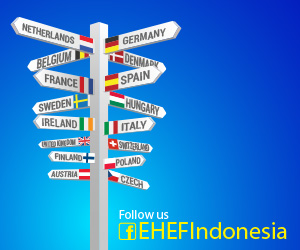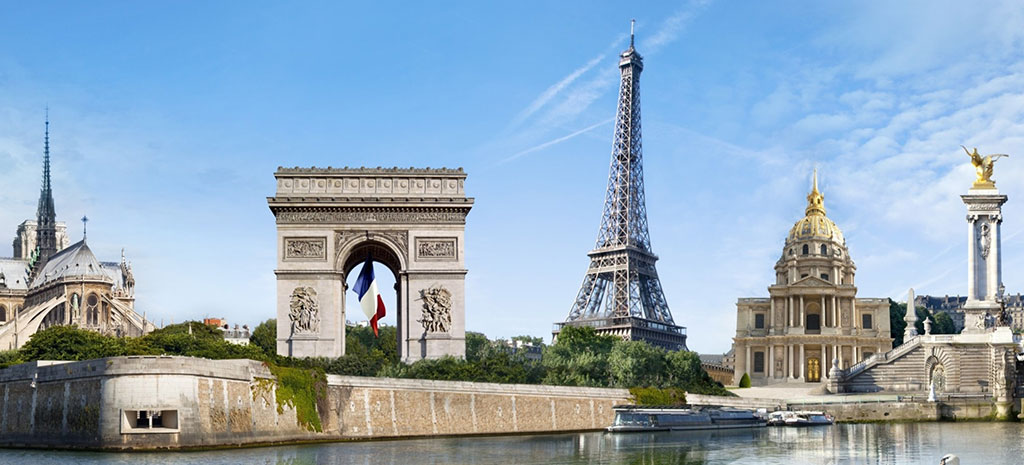
Study in France
Last edited on 28 Feb 2026
Salut! Bienvenue en France!
Hi! Welcome to France!
France is well known for its high life quality, also one of the founding countries of the European Union. Moreover, it is the second largest country in the EU. France has been one of many major study destination in Europe. France raises up a distinct set of associations in our collective imagination. From the urbane sophistication and history of its cities, to its legendary food and wine, to the spectacular scenery – think rugged mountains and verdant forests, golden beaches and azure seas, rolling pastures and mighty rivers – everyone has their own idealized conception of France. This is reflected in its status as the world’s most popular tourist destination, according to the United Nations World Tourist Organization.
Most people associate French culture with Paris, which is a center of fashion, cuisine, art and architecture, but life outside of the City of Lights is very different and varies by region. France doesn't just have different cultures; the word "culture" actually comes from France. "'Culture' derives from the same French term, which in turn derives from the Latin colere, meaning to tend to the earth and grow, cultivation and nurture," Cristina De Rossi, an anthropologist at Barnet and Southgate College in London, told Live Science. Historically, French culture was influenced by Celtic and Gallo-Roman cultures as well as the Franks, a Germanic tribe. France was initially defined as the western area of Germany known as Rhineland but it later came to refer to a territory that was known as Gaul during the Iron Age and Roman era.
Higher Education System
In France, you can choose to study your bachelor's ("Licence"), masters or PhD ("Doctorat") degree, or participate in a summer course program, as the French educational system is designed to provide students with a wide range of study opportunities. You may consider to enroll in the university, if you opt to have more theoretical education, or if you prefer to have a degree with a vocational approach, you may want to consider Grandes Écoles or University Institutes of Technology. The French degrees awarded are based on the European system of Bachelor, Master, and PhD, expressed in credits as defined by the European Credit Transfer System (ECTS).
There are few countries which concentrate to invest much in research and education and France is one among few. The academic and education standard in France are considered very high, with a total of 41 French universities included in the QS World University Rankings 2015-2016; 27 French institutions are counted among the top universities in the world based on Times Higher Education’s World University Rankings 2016-2017. In addition, France is a popular study destination for international students with many renowned well developed research facilities and over 800 English-taught courses.
France is also known for its strong contingent of specialized business schools. However, due to their subject specific focus, these schools are not placed in the overall rankings, but nonetheless enjoy wide-reaching international reputations. Notable examples include ESCP Europe, ESSEC Business School, HEC Paris and INSEAD.
France is one of the forerunners of scientific and technological innovation. It owes this standing to its research capacity and its many achievements in such fields as aerospace, transportation, electronics, telecommunications, chemistry, biotechnology, health and mathematics, successes attested to by the number of French winners of Fields Medals and Nobel Prizes
To add more, tuition fees at the leading universities in France are among the lowest in the world, with annual fees averaging under US$1,000 per year for domestic and international students alike.
Language requirements for studies at universities and colleges in France
French
Since the language of instruction at French universities and colleges is French, you are required to prove your level of command of the French language. If you are enrolling in the first or second year of a study program at university in France, you must prove you have the adequate level of knowledge of French by either passing a language test or by obtaining a degree in French. If you are applying for studies at a Grande École, or you intend to study in the third year of a study program, or plan to enroll in a master's or PhD program, you will have to check the French language requirement with your school in France since it varies depending on the study program. In general, you are expected to have a level of command of the French language corresponding to B1/B2 in the European Language Passport.
For language test that is acceptable to enroll for a degree in France, you can contact the nearest Campus France or you can browse their website http://www.campusfrance.org/en
English
If your study program or course is taught in English, you will be required to prove your level of command of English by presenting the results you received at English courses. Please, always check with your university whether your English studies are sufficient for you to meet this requirement.
Universities in France
Student Cities in France
Paris
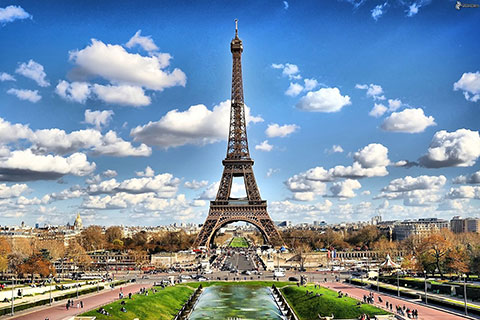
You will, no doubt, already have your own set of ideas regarding Paris, which may well be the result of a visit to the so-called City of Light. Around 45 million tourists descended on the city in 2015, pulled in by attractions including the Arc de Triomphe and Notre Dame, and world-famous galleries like The Louvre and the Musée d'Orsay, or just to experience the city’s celebrated café culture.
Like any other great city, the only way to truly get to know Paris is to live there and intermingle with the people who make the city what it is. If student life in Paris appeals to you, there is no shortage of great universities to choose from, including 17 public institutions (with varying specializations) and several prestigious grandes écoles. As a result, the city has a large and diverse student community, which goes a long way to guaranteeing the continued vibrancy of its long-established intellectual and creative culture.
Lyon
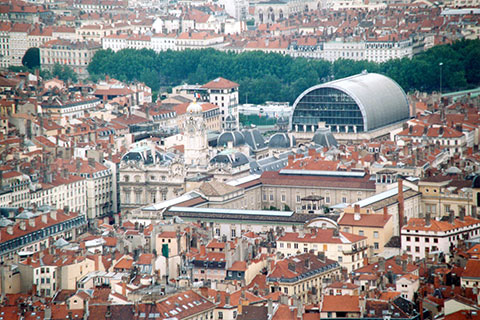
With some of the top schools not just in France but Europe, Lyon situated in South Eastern France, is no less than an international student city. Its strategic location in French Alps and proximity to Swiss and Italian borders, offers you to travel to a new country over the weekends. A picturesque medieval city (though its history goes back even further than this), Lyon is situated close to France’s borders with Switzerland and Italy. It is known for being one of the culinary capitals of France, and is also within spitting distance of the French Alps, for those who like to hit the piste.
Lyon’s well-preserved architecture has earned it UNESCO World Heritage Site status, but there is more to France’s joint second city (there’s some debate over whether Marseille or Lyon can claim this title) than spectacular architecture. Its many higher education establishments mean that it boasts a large student population, and, consequently, the vibrant nightlife commonly found in all student hubs. If it’s more civilized cultural pursuits you’re after, Lyon will not disappoint on that front either, while those who have one eye on their future career may be interested to hear that it is one of France’s main financial centers.
Montpellier
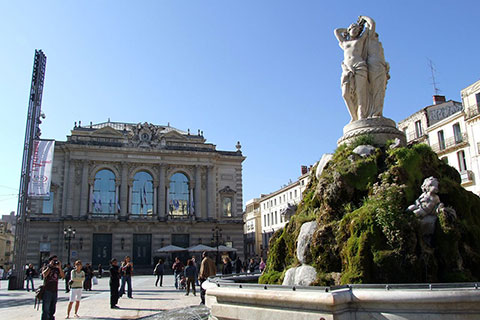
Another major student community is found in Montpellier. Around a quarter of the city’s population consists of attendees of its universities, two of which are featured in the QS World University Rankings 2016-2017, and one of which (Université Paul-Valéry Montpellier III) is the seventh-oldest in the world.
Montpellier’s location near France’s Mediterranean coast makes it a good option for sun-worshippers, though it also means you’ll have to brace yourself for a mass influx of tourists in the summer months. The benefit, of course, is that in the off season you can enjoy almost exclusive access to the beaches, and will be left with plenty of time to explore some of the more well-hidden pleasures that the South of France has to offer.
Toulouse
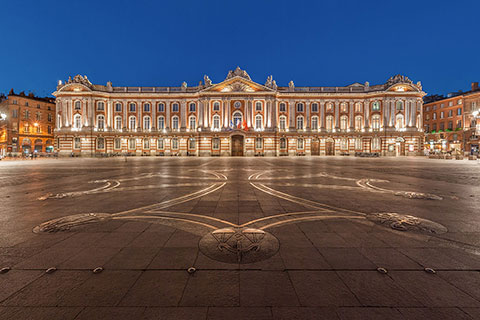
A historic city situated not too far from France’s south-western borders with Andorra and Spain, Toulouse is known in the modern age as one of the capitals of the European aerospace industry. Its universities are also historic, with the institution that is now split into Université Toulouse 1, Capitole and Université Toulouse II, Le Mirail having been founded in the 13th century.
Toulouse has a large student population, and is known for being a hotbed of alternative culture – alongside more traditional cultural outlets in the form of opera, theatre and immaculately preserved architecture. And if you want to get out of the city, then the South of France is your oyster, with the proximity of the Pyrenees allowing skiers to get their fix.
Lille
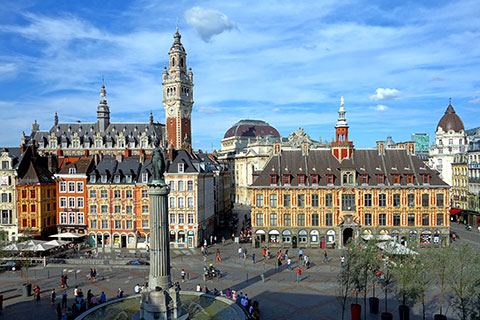
In former times, Lille was one of the main industrial centers of France, which meant an inevitable period of decline as the world entered the post-industrial age. However, in recent years the picturesque city has undergone something of a renaissance and is now considered by many to be one of France’s lesser-known treasures, with a vibrant cultural scene and a strong commercial backbone. The city has jumped five places in this year’s rankings after improving in each category
With its Eurostar terminal, Lille in northern France is always attractive for British students worried about being homesick. One of the main advantages of being based in Lille is the ease of travelling to explore other parts of France, and much of northern Europe. You can, in fact, catch an express train directly from Lille to the world’s two most popular tourist cities, Paris and London, or to Brussels, which can serve as a gateway to the Netherlands or Germany. If you’ve got the travel bug, Lille could be for you!
Application, Fees and Visas in France
Tuition fees in France
The major benefits enjoyed by those who study in France include relatively low tuition fees at public universities. For the majority of courses at most public universities in France, you will have to pay only EU€189 (around US$210) a year for a bachelor’s degree (there are exceptions – engineering courses tend to cost more for example).
It should be noted that universities in France tend to levy additional administrative charges, which are known to bring the price up considerably. That said, the final figure is still likely to be far lower than you would pay in a comparable destination.
You will pay more to study in France’s highly selective grandes écoles and grands établissements (great schools and establishments), which set their own fees. Some of these operate only at postgraduate level, and some – like Ecole Normale Supérieure, Paris – require students to either complete two years of preparatory school (which is nearly as selective as the grande école itself) or to transfer across after two or more years of an undergraduate course. Top management schools can charge up to €30,000 a year (~US $33,500).
Applications and student visas for France
The application process and visa requirements to study in France will depend on whether you come from a country in the EU, or from further elsewhere in the world. Students from Switzerland, Norway, Iceland and Liechtenstein are treated the same as EU students in this case.
Applicants from the EU:
If you want to start in the first year of a program and you hold a French baccalaureate, you must use the online application system used by French students (APB – admission post-baccalauréat). If you want to enter the system a little further on, you may apply directly to the institution at which you want to study.
If you have a different high-school qualification, you should get in touch with the institutions you want to apply to. They may request that you apply directly to them, rather than through the centralized system.
Grandes écoles and grands établissements have their own application procedures, so it’s advisable to get in touch directly to find out what it is required. You can apply to preparatory classes and to some establishments through APB if you want to enter in the first year.
You will not need a visa.
If your course is in French, as is likely, you will need to prove you are sufficiently fluent. You can do this by taking an exam such as the TCF DAP (Test de Connaissance du Français, Demande d’Admission Préalable), DALF (diplôme approfondi de langue française) or CEFR (Common European Framework of Reference for Languages). Similarly, you’ll need to prove you can speak English if that is the language of tuition. It’s advisable to check with the university to see which language test scores are accepted or preferred.
Applicants from outside the EU:
The application procedure will vary depending on whether or not you are from one of the 31 countries in which CampusFrance runs the CEF procedure. If you are from one of these countries (listed on the CampusFrance website), then you are obliged to use the CEF online application system. This guides you through the entire application process, including obtaining a visa, how to apply and which documents you require. You can create your personal profile in the CEF system through the CampusFrance website.
If you are not from one of these countries, you will need to submit a preliminary application at your local French embassy before applying to one or more French universities. The way in which you apply will depend on your previous qualifications and where you are applying. Contact the establishment(s) you’re thinking about attending for guidance on the correct procedure to follow.
Once accepted by a French institution, you’ll need to apply for a visa, which also includes a residence permit, called the VLS-TS. This is valid for a year at a time. In order to obtain this visa you will need to present a completed application form, passport photos, your passport, proof of your previous qualifications, a police certificate attesting to your lack of a serious criminal record, proof you can speak French to an appropriate level (if your course is taught in French, see above for details of French language tests) and proof you have sufficient financial means. You will, of course, also need to prove that you’ve been accepted to study at a French university.
When you arrive in France, you will need to contact the French Office of Immigration and Integration (OFFI), who may request that you undertake a medical examination.
Sources: Eurydice database (Eurydice is an international educational database developed by the European Commission and Member States of the European Union with the aim of facilitating and improving the understanding of the different educational systems in Europe).
TCF (Test de connaissance du français - Test of knowledge of French)
Le TEF (Test d’évaluation de français - French assessment test)
DELF (Diplôme d’études en langue française - Diploma of French-language studies)
DALF (Diplôme approfondi de langue française - Advanced diploma in French language)
CNOUS-CROUS
Fast fact
- Presidential republic with bicameral legislature
- President is head of state, while government is headed by prime minister
- Capital city (and largest city by far): Paris
- Official language: French
- Borders with Belgium, Luxembourg, Germany, Switzerland, Italy, Spain, Andorra and Monaco
- Most popular tourist destination in the world; in 2013, France was visited by 84.7 million people
- Population of 67 million, of whom 2.2 million live in Paris
- International dialing code: +33
- Currency: Euro (€)
- Uses Central European Time (UCT+1), shifting to Daylight Savings Time (UTC+2)
- France produces around 400 distinct varieties of cheese (possibly more, depending on how you count them).
- France owns a number of overseas territories, some of which – such as French Guiana in South America – are considered to be part of France, and therefore the European Union.
Bonjour, from the romantic and chic country of Europe! It must have been a well-known label for France, but dig more than just it. In fact, this country becomes the third highest foreign student recruiter in the world. France government support 90% of the tuition fees so that European or non-European students could experience affordable yet qualified education and recognized world-wide. You might require studying in French, but believe it or not French would be your valuable asset for your future career as it is an official language for 29 countries and United Nations. Long story short, study in France lead you to open a new professional opportunities.
In Indonesia, you could reach out Campus France as the official representative of the government providing information and advice about study in France including guide you through the admission process.
BGF (Bourse du Gouvernement Français)
Focus Scholarship: Master and PhD
Competition: Designated country: Indonesia
Scholarship Coverage: Full scholarship
BGF offers 300 full scholarships for Master and PhD (18 months) degrees per year for Indonesian Students. This scholarship program brought together Indonesian Government, France companies in Indonesia and private foundations. It covers tuition fees in public universities, visa and insurance at cost including living allowance and return international travel tickets.
Criteria
- Priority study program such as: Sciences, Engineering, Social Studies and Political Sciences.
- DELF B2 language level is mandatory to continue your studies in France, while the DELF B1 is sufficient for science and technology, doctoral programs and master's programs WITH instruction in English.
- Please note that you need to receive A Letter of acceptance from your destination university BEFORE applying BGF.
Eiffel Scholarships
Focus Scholarship: Master and PhD
Competition: Developing Country
Scholarship Coverage: Full scholarship
Eiffel scholarship programs are available for students from developing countries who would like to continue their studies in France (one to two years). Eiffel scholarships will cover the living cost during the study period with the amount of 1181 Euro for master's level and 1,400 Euro for doctorates program. In addition, tickets for round-trip as well as health insurance also covered by the program. Eiffel scholarships available on 26 – 1st December each.
Criteria
- Maximum 30 years old (Master) and 35 years old (PhD)
- Key selection criteria: Excellence International politics represented by candidate’s organization/ institution Politics cooperation between Ministry of Foreign Affairs, European Union, and candidate’s country of origin
- Priority areas include: Sciences, Political Sciences, Agriculture, Social Sciences, and Engineering.








